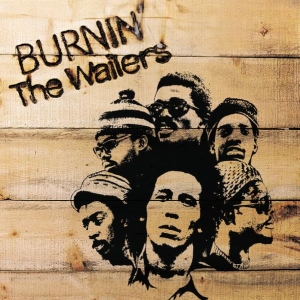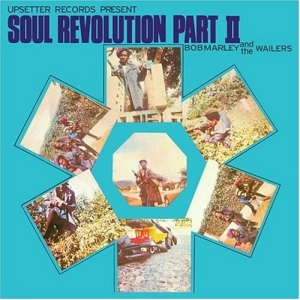
Lee "Scratch" Perry was a Jamaican record producer, composer and singer noted for his innovative studio techniques and production style. Perry was a pioneer in the 1970s development of dub music with his early adoption of remixing and studio effects to create new instrumental or vocal versions of existing reggae tracks. He worked with and produced for a wide variety of artists, including Bob Marley and the Wailers, Junior Murvin, The Congos, Max Romeo, Adrian Sherwood, Beastie Boys, Ari Up, The Clash, The Orb, and many others.

Exodus is the ninth studio album by Jamaican reggae band Bob Marley and the Wailers, first released in June 1977 through Island Records, following Rastaman Vibration (1976). The album's production has been characterized as laid-back with pulsating bass beats and an emphasis on piano, trumpet and guitar. Unlike previous albums from the band, Exodus thematically moves away from cryptic story-telling; instead it revolves around themes of change, religious politics, and sexuality. The album is split into two halves: the first half revolves around religious politics, while the second half is focused on themes of making love and keeping faith.

East of the River Nile is a 1977 reggae studio album by Jamaican musician Augustus Pablo. A purely instrumental album, East of the River Nile showcases Pablo's skill on the melodica, and various other keyboards. Also featured are studio musicians famous as members of The Wailers, Bob Marley's backing band.

Burnin' is the sixth album by Jamaican reggae group the Wailers, released in October 1973. It was written by all three members and recorded and produced by the Wailers in Jamaica, contemporaneously with tracks from the Catch a Fire album with further recording, mixing and completion while on the Catch a Fire tour in London. It contains the song "I Shot the Sheriff". It was the last album before Marley, Peter Tosh and Bunny Wailer decided to pursue solo careers, while continuing their local releases through their company Tuff Gong Records. A commercial and critical success in the United States, Burnin' was certified Gold and later added to the National Recording Registry, with the Library of Congress deeming it historically and culturally significant.

Bob Marley and the Wailers were a Jamaican ska, rocksteady and reggae band. The founding members, in 1963, were Bob Marley, Peter Tosh, and Bunny Wailer.

Soul Rebels is the second studio album by the Wailers, their first album to be released outside Jamaica. The Wailers approached producer Lee "Scratch" Perry in August 1970 to record an entire album, and the sessions took place at Randy's recording studio above Randy's Record Mart at 17 North Parade in Kingston, Jamaica, until November. First issued in the UK by Trojan Records in December 1970, the album has since been re-released several times on several different labels. Perry's production is sparse and haunting, only featuring guitar, bass, drums, electronic organs, and vocals with no horns or other embellishments.

Soul Revolution Part II is the third album by Bob Marley and the Wailers. It was produced by Lee "Scratch" Perry. While the name on the album cover for all the original releases was Soul Revolution Part II, some releases had the name Soul Revolution printed on the album label, leading to uncertainty over what name was intended. A "dub" version with the vocals removed was released as Soul Revolution Part II Dub; both versions were released as one set in 1988. The album was repackaged with additional material as African Herbsman in 1973.

Black Board Jungle, often called Blackboard Jungle Dub, is a studio album by The Upsetters. The album, originally released in 1973 under artist name "Upsetters 14 Dub", was pressed in only 300 copies and issued only in Jamaica.

Super Ape is a dub studio album produced and engineered by Lee "Scratch" Perry, credited to his studio band The Upsetters.

Aston Francis Barrett CD, often called "Family Man" or "Fams" for short, is a retired Jamaican musician and Rastafarian.
Culture Press is an independent record label from UK specialized in Jamaican music.
Upsetter Records was a Jamaican record label set up by Lee "Scratch" Perry in 1968. Perry also opened the Upsetter Record Shop where he sold the records he produced.
One drop rhythm is a reggae style drum beat.
The Hippy Boys was a Jamaican band formed in 1968 by Lloyd Charmers. The band included guitarist Alva "Reggie" Lewis, organist Glen Adams, and brothers Aston 'Family Man' Barrett on bass guitar and Carlton Barrett on drums.

Earl "Chinna" Smith, a.k.a. Earl Flute and Melchezidek the High Priest, is a Jamaican guitarist active since the late 1960s. He is most well known for his work with the Soul Syndicate band and as guitarist for Bob Marley & the Wailers, among others, and has recorded with many reggae artists, appearing on more than 500 albums.

Zap Pow is a Jamaican reggae band, founded by singer/bassist Michael Williams aka Mikey Zappow and guitarist Dwight Pinkney. Members also included singer Beres Hammond, trumpeter David Madden, saxman Glen DaCosta, and drummer Cornell Marshall. They originally existed from 1969 to 1979. They re-formed in 2016.

"Run for Cover" is a 1967 rocksteady and reggae single by Lee "Scratch" Perry, credited as Lee "King" Perry. The recording featured Perry, his band, Lynn Taitt on guitar and The Sensations as backing singers. It was recorded at Clifford Rae's WIRL studio and appeared on the WIRL record label in Jamaica, then in the UK on Graeme Woodall's Doctor Bird (label), both pressings with "Something You've Got" on the B-side.
"Return of Django" is a 1969 instrumental by the Upsetters, a studio band, led by Lee "Scratch" Perry, who wrote and produced the song. Backed with "Dollar in the Teeth", it made #5 on the UK Singles Chart.
The following outline is provided as an overview of and topical guide to Bob Marley:











